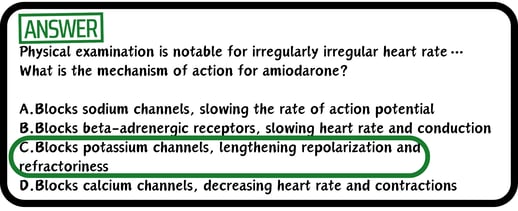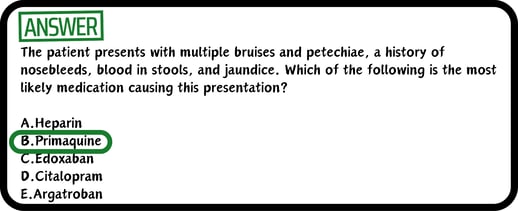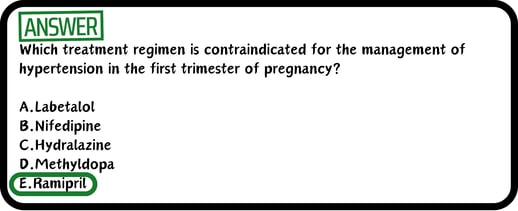Why USMLE Exam Takers Get Multiple-Choice Questions Incorrect and How to Overcome This
Explore practical strategies to tackle the challenges of picking incorrect answers in USMLE exams, fostering better test performance and more profound understanding in medical professionals.
TEST TAKING STRATEGIES
Nakia T. Allen-Berhan, MD, MHA
1/1/20256 min read
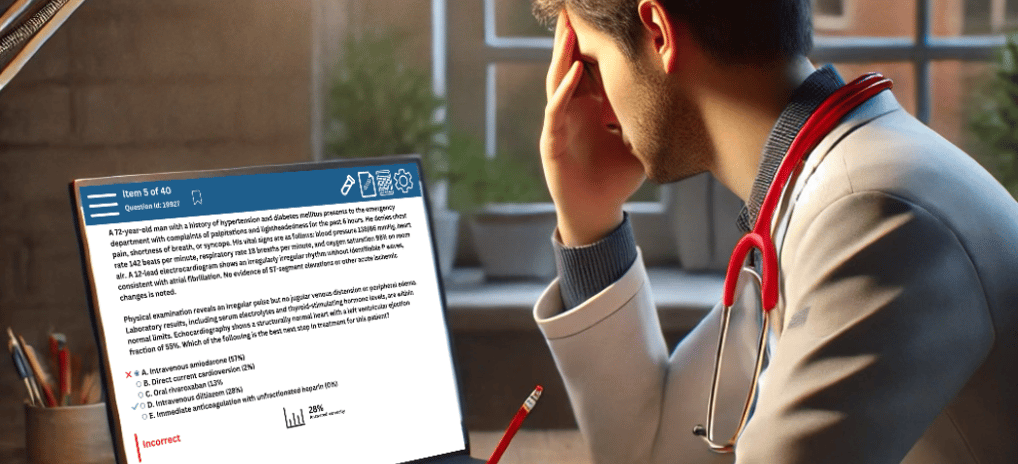

We all get questions incorrect when taking exams, regardless of the subject or the exam format. Doctors in training and licensed practitioners are no exception. Information constantly evolves, no matter how much experience we garner over the years or how long we study. We can never master everything about medicine, as the knowledge base is exceptionally vast and growing daily.
Nevertheless, medical professionals are still required to take periodic examinations to gain initial licensing to practice medicine and to keep licensure active. These career choices mean a lifetime of testing. When discussing questions my students have gotten incorrect, my initial question is: Why did you think you got this question wrong?
It is easy to become obsessed with learning “what” the correct answer is. However, understanding the “why” is the real key to maximizing exam preparation efficiency and test-taking strategies while simultaneously enhancing knowledge retention. Let’s discuss the most common reasons I see students answer questions incorrectly and how to fix each of these challenges.
Knowledge deficits resulting in selecting incorrect answers is a no-brainer. For obvious reasons, if you are unfamiliar with the testable information, whether it be a disease, diagnosis, pharmacologic treatment, mechanism of action, etc., you will more often than not get the question incorrect because insufficient understanding of core concepts can make it impossible to differentiate between alternative probable options based on subtle vignette nuances.
Lack of Foundational Knowledge


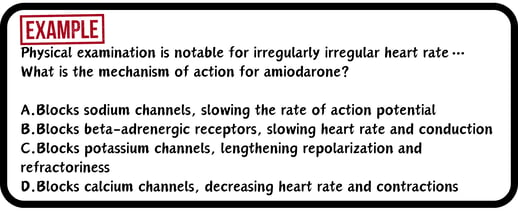

Mastering the content takes time, review, and application. In this case, the solution involves memorizing the key concepts and then practicing applying this knowledge to develop a deeper understanding that will remain accessible in your mind for years to come. Here are some specific techniques to improve foundational knowledge:
Please note that practicing questions does not mean completing the same question bank multiple times. Instead, exposure to different questions in different writing styles proves more effective than repeating the same questions numerous times due to subconscious memory prompting you to falsely see improvement by getting the question correct without gaining a deep understanding of the tested concept.
Active Recall: After an initial review of the material, there are multiple ways to test yourself with active recall. These include the use of 1. Anki/Flashcards with spaced repetition, 2. white-boarding without using study notes, 3. creating personalized mnemonics, 4. having a peer quiz you on the concepts without any aids, and 5. teaching the concepts to another in your own words.
Integrate Knowledge: Avoid studying material in a vacuum of disparate facts. Integrating the details into a larger picture makes it easier to understand the concept and create a mental schema of the pathology along with diagnostic methods, interventions, and signs/symptoms identification, facilitating recognition of key concepts regardless of the presentation style. Achieve a mental “big picture” by 1. connecting concepts visually (e.g., concept mapping, medical videos), 2. listening to podcasts, 3. creating study groups to explore challenging topics (e.g., biostatistics, ethics and legal issues, biochemistry, neuroanatomy, pharmacology) through discussion of clinical vignettes.
Practice Questions: There is no way to avoid practicing applying the new knowledge multiple times in different ways until it becomes innate. Exam writers may test a singular concept in various ways by altering the phraseology of the question. Working through questions in weaker subjects can be frustrating and perceived as time-consuming; however, persistence pays off. The subjects you spend the most time practicing will eventually become a strengthened base knowledge in your mental arsenal.
It feels much more comfortable to default to the answer choice that is familiar to us rather than select the one we do not recognize despite vignette clues that do not entirely support the familiar answer choice. This is a common bias in exam-taking known as the 'familiar answer' bias. Although fear of the unknown or foreign is natural, we must train ourselves to select the most supported answer.
There is only one best answer for multiple-choice board examination questions.
Choosing the Most Familiar Answer
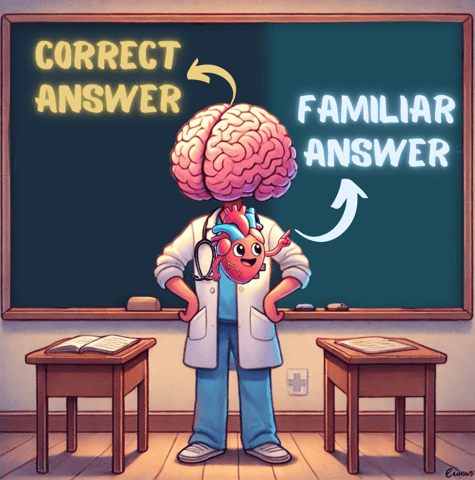

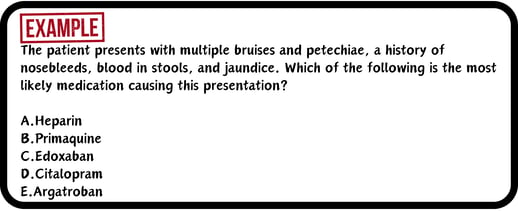

Overcoming this can be difficult. Nevertheless, there are methodical strategies to avoid answering questions incorrectly due to selecting answers based on comfort and recognition. Among these solutions are:
Contextualizing Familiar Terms: Evaluate whether the familiar answer fits this particular vignette scenario. Break down the clinical presentation into its components (e.g., symptoms, lab results, epidemiology) and compare it to the features of the familiar term. If the vignette gives five clues and four support the familiar answer, but one contradicts it, it’s fair to say the familiar choice is not the best.
Utilize a Differential Diagnosis List: Making a quick mental or written differential list based on the question stem creates a framework within which to work. This structured approach helps you compare and contrast the familiar answer with the less familiar but potentially correct option, reducing the tendency to default to familiarity.
Playing Devil’s Advocate: Challenging your thought process by asking yourself, “Why not?” For the familiar answer, explicitly identify why it might not fit the vignette. Active mental engagement with self-litigation forces you to evaluate the choice critically and encourages deeper reasoning instead of basing your answer on a gut reaction.
On game day, many additional stress factors are absent when studying at home and preparing for the actual exam. Excessively elevated serum cortisol levels due to high-stakes exam stress, lack of control regarding the environment (e.g., temperature, mouse pad/keyboard, noise level in the testing room), and nervousness about passing the exam all impact cognitive function and are nonproductive for examination success.
The heightened level of stress and attempts to manage your time effectively by skimming question vignettes on the exam can increase the risk of reading errors, further exacerbating the situation.
Misreading the Question or Key Details
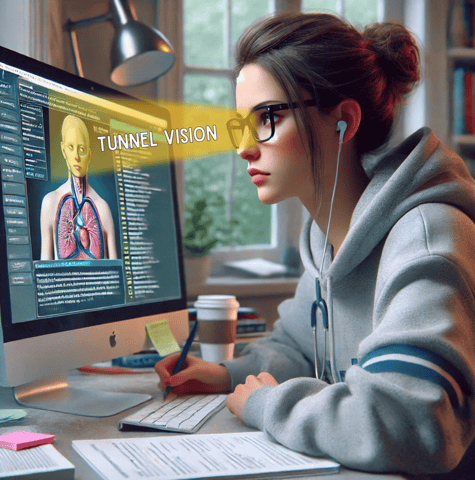

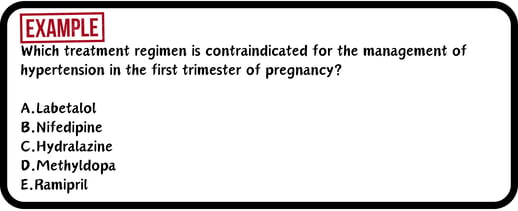

Rehearsal multiple times well before exam day will certainly help calm your nerves, improving your cognition on exam day because it will become routine. Additionally, using a strategy when managing your time while taking the exam will also give you more time to examine the questions. Here are some additional solutions to thwart this frequent hiccup:
This post introduces tips and tricks I impart to students to maximize USMLE exam scores during tutoring sessions. Soon, I will publish a compendium of other ways to improve test-taking skills and rise to the top of the bell curve. If you are interested in reading more about this topic, make sure to subscribe to our YouTube channel for updates when this resource becomes available!
Remember, USMLE scores do not define your worth and value as a physician. They are a tool to evaluate base knowledge to yield the safe delivery of patient care. At MedUPTICK, we are committed to helping you elevate your clinical mastery so you will not only score well on exams but also be equipped with life-long knowledge and learning skills to deliver exceptional care to our respective communities. Cheers for now!
Rephrase the Question: Rewording the question in your terms will promote comprehension of the primary objective evaluated by the question.
Slow Down: Allocating a few additional seconds per question to read the vignette carefully improves accuracy. Mentally processing each sentence as you read through the question is extremely useful because it significantly reduces the need to re-read the vignette more than once, further maximizing your time management.
-Avoid Excess Time on Select Questions: When we encounter a question that we find more challenging, we can dwell on the question longer than we should. However, sometimes, we do not know the information well enough and are likely to get it incorrect no matter how much time we spend on the question.
In this case, when we recognize that determining the correct answer is futile, it is best to flag the question, select the “letter choice of the day,” and move to the next question. This action provides more time for the questions you will likely get correct and increases your chance to see all questions in the exam block before time runs out.
ANSWERS TO EXAMPLE QUESTIONS ABOVE
